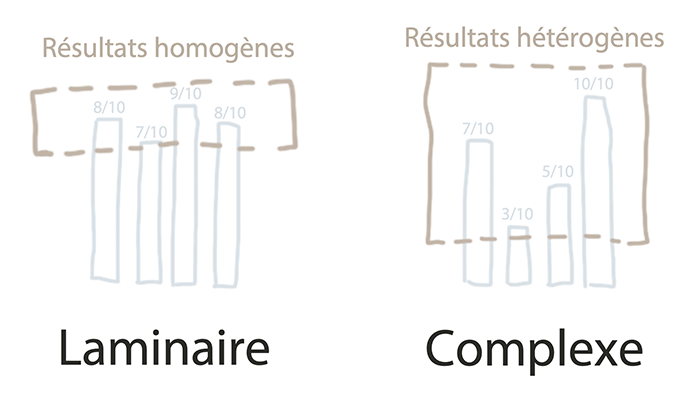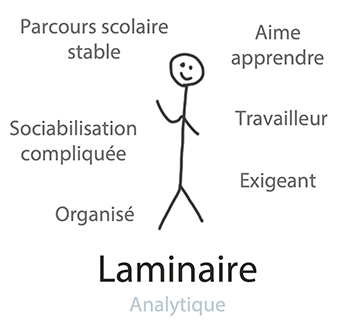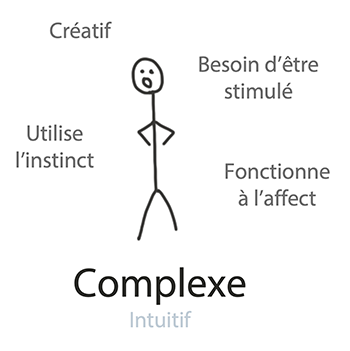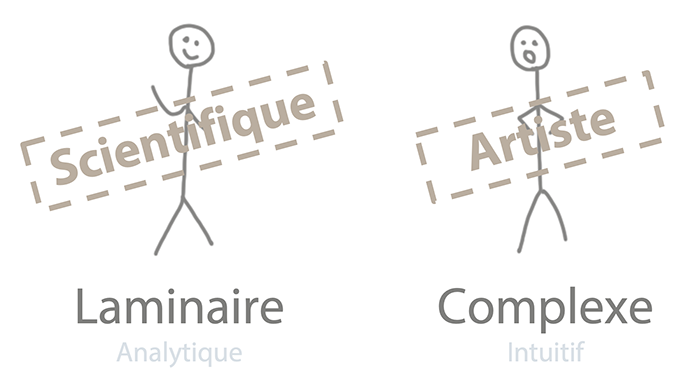Depuis quelques temps, je rencontre des zèbres à travers toute la France. Et à chaque fois, malgré nos grandes similitudes, nous sommes différents. Notre haut potentiel est différent. Nos rayures sont différentes, bien que très proches. Alors pourquoi ?
En parallèle, je continue mes recherches sur la douance. Je tombe souvent sur des thèmes comme surdoué complexe, QI hétérogène, philo cognitif, profil laminaire… qu’est-ce que ça veut dire ? À quoi ça sert ? Pourquoi, encore, chercher à mettre tout le monde dans une case ?
Est-ce que, finalement, ces différentes nominations ne pourraient pas avoir un rapport avec les différentes douances ?
Dans cet article, on va tenter de comprendre la nature de ces particularités pour arriver à se positionner soi-même. Si vous êtes un zèbre, ça vous aidera à mieux appréhender votre douance. C’est d’ailleurs en partie pour ça que certains n’arrivent pas à gérer leur haut potentiel intellectuel au quotidien.
Je m’appelle Paul, et mon haut potentiel a été diagnostiqué il y a plus de 10 ans maintenant. Aujourd’hui, je partage ce que j’ai appris depuis pour aider les nouveaux à se comprendre, s’accepter, à s’aimer.
NB : il s’agit d’un article initialement diffusé sous forme de vidéo (ci-dessus). Les textes que vous voyez ici en sont la retranscription.
Adulte surdoué complexe vs laminaire : d’où vient cette différence ?
Les profils complexes et laminaires ont été découverts par Fanny NUSBAUM, Olivier REVOL et Dominic SAPPEY-MARINIER. Ils en parlent dans leur livre Les Philo-Cognitifs.
En quoi ça consiste ? C’est très simple.
Il y a peu, je vous avais parlé des tests de quotients intellectuels. Ils sont en fait divisés en plusieurs sous-tests, appelés subtests. Notre score de QI global est donc en réalité composé de tous ces sous-scores.
Si vous obtenez des résultats élevés partout, on dit que vous avez des résultats homogènes et un profil laminaire. À l’inverse, si vous obtenez des scores variés, on dit que vous avez des résultats hétérogènes et un profil complexe.

Facile, non ? Même si cette distinction entre le HP complexe et le HP laminaire ne semble être que mathématique, elle a en réalité des impacts bien plus grands sur la vie du surdoué.
Caractéristiques du haut potentiel laminaire
Le profil laminaire serait globalement une personne plutôt analytique : il ressemble au stéréotype du cerveau gauche. Il a un parcours scolaire plutôt stable, il aime apprendre et est travailleur. Ses intérêts sont plutôt différents de ceux de ses camarades d’école ce qui rend sa sociabilisation compliquée. Au travail, il sera quelqu’un d’exigeant et d’organisé, et il travaillera dur pour atteindre ses objectifs.
Dans l’imaginaire collectif, c’est comme ça que l’on imagine la personne surdouée : avec des bons résultats, bosseuse, mais pas spécialement sociable.
Notez que c’est également le profil le moins bien étudié et connu par les psychologues et la science car… ils n’y vont pas (chez le psychologue). Vu que de l’extérieur tout va bien pour eux (ils bossent bien, sont sages et ont un bon travail). Ils ne sont que trop peu détectés en étant enfant et plus tard. C’est une population qui « se fond bien dans la masse » et arrive à s’ancrer dans la société.

Caractéristiques du haut potentiel complexe
A l’inverse, le profil complexe est plutôt créatif et intuitif. Lui, il coche toutes les cases du cerveau droit. Il est très créatif et a besoin d’être en permanence stimulé. Il prend des décisions en se basant sur son instinct. Il est hypersensible et c’est sa grande sensibilité qui le guide dans ses choix.
Globalement, le surdoué complexe ne correspond pas à l’image que l’on se fait de la personne zèbre. Ce n’est pas Einstein quoi. Par contre, c’est le profil que l’on connaît le mieux car ses difficultés scolaires (comme le refus de l’autorité, sa vision particulière du monde et de la vérité) poussent souvent ses parents à lui prendre rendez-vous chez une psychologue.
Ce que je trouve amusant, c’est que ce sont les enfants précoces complexes qui sont mieux détectés du fait de leurs difficultés scolaires. Pourtant, l’imaginaire collectif a tendance à considérer que la personne surdouée (le « génie ») ne peut qu’avoir des résultats exemplaires.

Pour caricaturer, le zèbre laminaire va avoir un profil plutôt scientifique, alors que le zèbre complexe sera plutôt artiste.
Attention petite précision : les portraits que j’ai dressés ici sont des portraits types. Personne ne correspond à 100% à une case où à une autre. Vous me connaissez maintenant : je pense qu’il y a autant de formes de hauts potentiels que de personnes à hauts potentiels. Même si certaines grandes lignes sont communes, nous avons tous nos particularités.

Alors, plutôt complexe ou laminaire ?
D’ailleurs, vous, vous pensez être plutôt laminaire ou complexe ?
Les inconvénients de la distinction
De mon côté, cette distinction m’embête un petit peu. Mon test de quotient intellectuel me plaçait plutôt chez les laminaires : mes résultats étaient homogènes. Pourtant, je me reconnais aussi bien comme adulte laminaire que comme haut potentiel intellectuel complexe. Cela va plutôt dépendre des moments, mais j’essaye toujours de réunir le meilleur des deux mondes lorsque je prends une décision. A partir de là, comment je me classe ? Est-ce que je ne dois me fier qu’aux résultats de mes subtests de quotient intellectuel, ou alors à mon ressenti ?
De plus, le problème de cette nouvelle étiquette, c’est qu’elle essaye de classer la personne surdouée. Or, elle est, par nature, inclassable et indomptable. C’est d’ailleurs en partie de là que vient l’idée de zèbre de Jeanne Siaud-Facchin (car c’est le seul équidé* qui n’a pas été domestiqué par l’Homme).
Bref, on retombe sur mon idée de douances multiples. Chacun a sa propre façon d’exprimer son haut potentiel.
* avec le cheval de Przewalski
Les avantages de la distinction
Mais faire la distinction entre les laminaires et les complexes apporte aussi des bons côtés. Je pense par exemple à toutes les personnes qui ont découvert leur douance mais qui ne correspondaient pas au cliché du surdoué (donc plutôt les HP complexes). Ne pas ressembler à Einstein tout en étant surdoué peut faire se développer un véritable syndrome de l’imposteur.
Je pense donc que, pour ces personnes-là, découvrir la distinction est un véritable atout.
C’est en tout cas ce qu’il s’est passé pour une personne zèbre dont je suis très proche. Elle a été détectée très jeune, mais ne correspondait absolument pas à une élève modèle surdouée. Elle avait de mauvais résultats à l’école, et son TDAH (Trouble du Déficit de l’Attention avec Hyperactivité) n’a pas aidé. Résultat : elle ne s’est jamais vraiment sentie « validée » comme personne à haut potentiel. Du moins pas avant que sa psychologue ne lui explique qu’elle était une HPI complexe.
Conclusion
Récapitulons un peu tout ça.
Il existe deux « sous-catégories » de surdoués au sein même de la douance : les profils laminaires et les profils complexes. Cette distinction se fait en fonction de l’homogénéité ou de l’hétérogénéité des résultats aux subtests du test de QI.
Si la personne obtient des résultats homogènes, on dit qu’elle est HP laminaire.
À l’inverse, si elle obtient des résultats hétérogènes, on dit qu’elle est surdouée complexe.
Cette distinction a des impacts sur plusieurs points de la vie du haut potentiel intellectuel, et notamment sa personnalité. Le laminaire va être plus analytique et scientifique, alors que le complexe sera plutôt artiste et intuitif.
Comme pour tout, il s’agit là de profils types. Personne ne correspond parfaitement à ce schéma de personnalité. Moi le premier d’ailleurs : d’après mon test de quotient intellectuel je suis un surdoué laminaire. Cependant, mon expérience me fait me sentir un peu dans les deux camps. À mon avis, la frontière entre les deux est loin d’être imperméable.
Cette distinction est, à mon sens, principalement bénéfique pour les surdoués qui ne se reconnaissent pas dans la vision classique de la douance. Ils ne sont pas les nouveaux Einstein ou ne réussissent pas tout ce qu’ils entreprennent. Pour ces personnes-là, comprendre que la douance se présente sous de nombreuses formes permet de limiter le syndrome de l’imposteur qu’ils peuvent ressentir lorsqu’ils sont détectés.
Sources
- Nusbaum F., Revol O., Sappey-Marinier D., Les Philo-cognitifs : ils n’aiment que penser et penser autrement, 2019.
